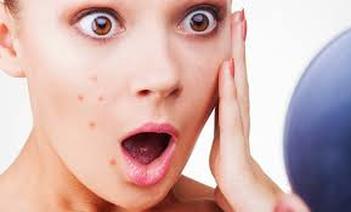 A 2012 study published in the Journal of Womens Health found that acne affects nearly half of all women aged 21-30, a quarter of women 31-40 and 12% of women 41-50 years old. With so many adult acne sufferers, it’s no wonder there are thousands of products on the market to treat acne. Many people try everything from scrubs to creams and any home remedy that can be found online. Unfortunately, these treatments are often just bandage solutions and tend to create more inflammation and damage in the skin. This in turn tends to increase oil production in the skin rather than healing it. Acne is a signal that something else is not quite working right. By actually figuring out why the acne is an issue we can better treat the underlying problem and like magic, the acne gets better too. Common Conventional Treatments: Commonly acne suffers are prescribed a number of drugs to combat the breakouts. Often the first line for women or teenaged girls is birth control. There are specific brands that are more commonly used for this purpose. Unfortunately, this is not resolving the issue but only just suppressing the natural hormone production so there are fewer hormones to stimulate secretions. Birth control pills are often found to cause many side effects including an increased risk of blood clots, headaches, and lowered sex drive. For more information, check out my blog on sex drive. In addition, those who are prone to increased androgen production such as in PCOS/ PCOD are often prescribed spironolactone, which is used to suppress androgenic effects by blocking receptors. Originally spironolactone was used for treatment of hypertension and heart failure. The most common side effects include: drowsiness, dizziness, lightheadedness, stomach upset, diarrhea, nausea, vomiting or headache but can also exhibit more serious side effects such as increased thirst, signs of kidney problems (such as change in the amount of urine), mental/mood changes, unusual fatigue/weakness, muscle spasms, menstrual period changes, breast pain, sexual function problems, signs of infection (e.g., fever, persistent sore throat), severe stomach/abdominal pain, persistent nausea/vomiting, vomit that looks like coffee grounds, dark urine, yellowing of the eyes/skin and easy bruising/bleeding. The other conventional treatment for acne is Accutane. This is a high dose Vitamin A medication. This medication can cause severe, life threatening birth defects and women using this medication are required to use 2 forms of birth control. It is also extremely hard on the kidneys and liver. While these conventional treatments can be effective short-term or while they are being taken, they do not get to the root of the problem. Often people need to discontinue the drugs for any number of reasons and the acne returns. Diet Encouraging dietary change is quite difficult in most patients; we are definitely creatures of habit. This can be an effective way to control some types of acne and reduce inflammation in the body as a whole. Acne is often found in association with blood sugar imbalances and higher than normal fasting insulin. This can be due to diet or due to other hormonal imbalances and stress. In a 2007 study, Australian researchers found that people who followed a low glycemic diet (low in foods that tend to spike the blood sugar such as sugars and simple carbohydrates like bread and pasta) had a 22% reduction in acne lesions. It is suspected that the higher insulin levels contribute to inflammation in the follicles and increase oil production. Milk is supposed to do you good, right? Well, maybe not. A 2006 Harvard study found that girls who drank 2 or more glasses of milk per day had a 20% higher risk of acne than those who consumed less than 1 glass of milk per week. Other studies also found a specifically higher risk with non-fat milk, which is higher in sugar than whole milk. In addition, it is postulated that dairy may have hormonal effects that contribute to increased acne. A Naturopathic Approach When naturopathic doctors look at an acne case we may be more concerned about your periods and digestion than your skin. This is because we are looking for the root cause of your acne rather than something that will supress your symptoms. There are generally only a few distinct causes of adult acne:
In your initial assessment, we will take into account your entire medical history and may require that you complete some additional testing to get a better idea of which type of treatments may be most effective for you. As not all patients have the same cause of acne, there is absolutely no way that they can all be treated the same. That said there are a few things that reduce the severity and frequency of acne breakouts in most people. If you'd like to book your assessment and begin the steps to eliminate your acne, please contact the clinic that is most convenient for you by clicking here.
0 Comments
Leave a Reply. |
Frances Wang, NDA naturopathic doctor and a mother who loves life, the outdoors and exercise. Archives
August 2017
Categories |
 RSS Feed
RSS Feed
